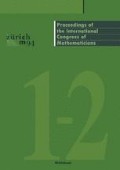Abstract
In 1849 the Swiss mathematican ENCKE wrote to GAUSS, asking whether he had ever considered trying to estimate Π(x), the number of primes up to x, by some sort of “smooth” function. On Christmas Eve 1849, GAUSS replied that “he had pondered this problem as a boy” and had come to the conclusion that “at around x, the primes occur with density 1/log x.” Thus, he concluded, π(ϰ) could be approximated by
.
Access this chapter
Tax calculation will be finalised at checkout
Purchases are for personal use only
Preview
Unable to display preview. Download preview PDF.
References
A. Balog, The prime k-tuplets conjecture on average, Analytic Number Theory (B.C. Berndt, H.G. Diamond, H. Halberstam, A. Hildebrand, eds.), Basel and Birkhäuser, Boston, 1990, pp. 165–204.
E. Bombieri, J. B. Friedlander, and H. Iwaniec, Primes in arithmetic progressions to large moduli III, J. Amer. Math. Soc. 2 (1989), 215–224.
A. A. Buchstab, On an asymptotic estimate of the number of numbers of an arithmetic progression which are not divisible by relatively small prime numbers, Mat. Sb. 28/70 (1951), 165–184 (Russian).
H. Cramer, On the order of magnitude of the difference between consecutive prime numbers, Acta Arith. 2 (1936), 23–46.
H. Davenport, Multiplicative Number Theory (2nd ed.), Springer-Verlag, Berlin and New York, 1980.
J. B. Friedlander and A. Granville, Limitations to the equi-distribution of primes I, Ann. of Math. (2) 129 (1989), 363–382.
J. B. Friedlander and A. Granville, Limitations to the equi-distribution of primes IV, Proc. Royal Soc. London Ser. A 435 (1991), 197–204.
J. B. Friedlander and A. Granville, Limitations to the equi-distribution of primes III, Compositio Math. 81 (1992), 19–32.
J. B. Friedlander and A. Granville, Relevance of the residue class to the abundance of primes, Proc. Amalfi Conf. on Analytic Number Theory (E. Bombieri, A. Perelli, S. Salerno, U. Zannier, eds.), Salerno, Italy, 1993, pp. 95–104.
J. B. Friedlander, A. Granville, A. Hildebrand, and H. Maier, Oscillation theorems for primes in arithmetic progressions and for sifting functions, J. Amer. Math. Soc. 4 (1991), 25–86.
P. X. Gallagher, On the distribution of primes in short intervals, Mathematika 23 (1976), 4–9.
D. A. Goldston, On the pair correlation conjecture for zeros of the Riemann zeta-function, J. Reine Angew. Math. 385 (1988), 24–40.
A. Granville, Harald Cramer and the distribution of prime numbers, Scand. Actuarial J. 2 (1995), to appear.
G. H. Hardy and J. E. Littlewood, Some problems on partitio numerorum III On the expression of a number as a sum of primes, Acta Math. 44 (1923), 1–70.
A. Hildebrand and H. Maier, Irregularities in the distribution of primes in short intervals, J. Reine Angew. Math. 397 (1989), 162–193.
H. Maier, Primes in short intervals, Michigan Math. J. 32 (1985), 221–225.
H. L. Montgomery, The pair correlation of zeros of the zeta function, Proc. Sympos. Pure Math., vol. 24, Amer. Math. Soc., Providence, RI, 1973, pp. 181–193.
M. Nair and A. Perelli, On the prime ideal theorem and irregularities in the distribution of primes, Duke Math. J. 77 (1995), 1–20.
A. M. Odlyzko, The 10 20 th zero of the Riemann zeta function and 70 million of its neighbors, to appear.
M. Rubinstein and P. Sarnak, Chebyshev’s bias, to appear.
Z. Rudnick and P. Sarnak, The n-level correlations of the zeros of the zetafunction, C.R. Acad. Sci. Paris, to appear.
A. Schinzel and W. Sierpinski, Sur certaines hypotheses concernant les nombres premiers, Acta Arith. 4 (1958), 185–208.
A. Selberg, On the normal density of primes in small intervals and the difference between consecutive primes, Arch. Math. Naturvid. J. 47 (1943), 87–105.
Author information
Authors and Affiliations
Editor information
Editors and Affiliations
Rights and permissions
Copyright information
© 1995 Birkhäser Verlag, Basel, Switzerland
About this paper
Cite this paper
Granville, A. (1995). Unexpected Irregularities in the Distribution of Prime Numbers. In: Chatterji, S.D. (eds) Proceedings of the International Congress of Mathematicians. Birkhäuser, Basel. https://doi.org/10.1007/978-3-0348-9078-6_32
Download citation
DOI: https://doi.org/10.1007/978-3-0348-9078-6_32
Publisher Name: Birkhäuser, Basel
Print ISBN: 978-3-0348-9897-3
Online ISBN: 978-3-0348-9078-6
eBook Packages: Springer Book Archive

